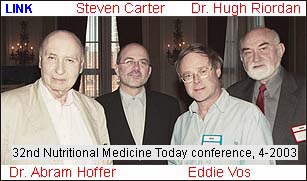Sites singled out for some comments.
 Dr. Atkins was a 'low-carb weight loss' and nutrition guy. His science about flour, sugar, glucose-fructose and supplements is excellent and his ideas about omega-3, homocysteine and refined-food mainstream. Atkins with its supplements and food pyramid can make a balanced nutritional mix and Dr. Atkins was a 'low-carb weight loss' and nutrition guy. His science about flour, sugar, glucose-fructose and supplements is excellent and his ideas about omega-3, homocysteine and refined-food mainstream. Atkins with its supplements and food pyramid can make a balanced nutritional mix and  effective low sugar-'n-starch weight-loss program (1,
2) Like any 'diet', it has risks without the prescribed vegetables and vitamins. Polar opposite 'low-fat' almost vegetarian Ornish also recomments supplements.
'Atkins' must be considered through all its 4 stages to see where it can benefit obesity and diabetes -and alleged risks of 'ketosis'. Ketones are made in the burning of fat and are a yardstick for results in his diet. Since body-fat doesn't just evaporate, Atkins calls ketosis: 'one of life's charmed gifts. It's as delightful as sex and sunshine, and it has fewer drawbacks.' Now there's a science project! Comparing 4 diets in 2007: Low-carb Atkins 'still' best for weight loss.
effective low sugar-'n-starch weight-loss program (1,
2) Like any 'diet', it has risks without the prescribed vegetables and vitamins. Polar opposite 'low-fat' almost vegetarian Ornish also recomments supplements.
'Atkins' must be considered through all its 4 stages to see where it can benefit obesity and diabetes -and alleged risks of 'ketosis'. Ketones are made in the burning of fat and are a yardstick for results in his diet. Since body-fat doesn't just evaporate, Atkins calls ketosis: 'one of life's charmed gifts. It's as delightful as sex and sunshine, and it has fewer drawbacks.' Now there's a science project! Comparing 4 diets in 2007: Low-carb Atkins 'still' best for weight loss.
 Uncle Sam's National Heart, Lung and Blood Instutite promotes drugs well beyond where the FDA, another department, allows drug companies to go: '.. if you have an LDL level of over 130 mg/dl [3.3 mmol/L], you will generally need [sic] to take medicine' This is a dangerous generalization not supported by
science and one that promotes cancer, congestive heart failure and more if you use a statin. For the record, when comparing regions in Europe, there are several where 10% less 'bad' LDL is associated with 4 times more heart disease. Uncle Sam's National Heart, Lung and Blood Instutite promotes drugs well beyond where the FDA, another department, allows drug companies to go: '.. if you have an LDL level of over 130 mg/dl [3.3 mmol/L], you will generally need [sic] to take medicine' This is a dangerous generalization not supported by
science and one that promotes cancer, congestive heart failure and more if you use a statin. For the record, when comparing regions in Europe, there are several where 10% less 'bad' LDL is associated with 4 times more heart disease.  Explain that Mr. NHLBI ... and how to explain the "exceptionally low" heart disease in this population with LDL at 186? Just one ugly fact disproves an entire pretty theory ... remember Columbus? The site hardly deals with nutrition apart from avoiding fat and cholesterol, and 'unlimited' egg substitute***. Yet, blindly avoiding fat and cholesterol and following the USDA food pyramid is guaranteed to do little for your heart (see Harvard) as such thinking
Explain that Mr. NHLBI ... and how to explain the "exceptionally low" heart disease in this population with LDL at 186? Just one ugly fact disproves an entire pretty theory ... remember Columbus? The site hardly deals with nutrition apart from avoiding fat and cholesterol, and 'unlimited' egg substitute***. Yet, blindly avoiding fat and cholesterol and following the USDA food pyramid is guaranteed to do little for your heart (see Harvard) as such thinking  is rapidly becoming the flat-earth theory of heart disease --apart from being the very cause of adult diabetes since that pyramid has flour as its largest food-group. is rapidly becoming the flat-earth theory of heart disease --apart from being the very cause of adult diabetes since that pyramid has flour as its largest food-group.
For future historians, safely preserved, here
is the 1994-2001 NHLBI / NCEP: if one parent has cholesterol over
240 (6.1 mmol/L), as of age 2 a child should have his cholesterol checked
... statins and sterols for baby? Then the NHLBI gives you the green
light for brownies, fat free mayo [?], gelatin desert, fruit leather and
turkey dogs [food clones..?], safflower oil for cooking [huh], tub margarine
[see below], cheese- and cup cake, lemon wafers, bread sticks [so far zero
fiber] and 'ready-to-eat cereals often' [if that doesn't promote
adult diabetes, nothing will]. Here's a jewel:
'Avoid fish oil pills because they are high in fat and calories'; let's hope so but apart from the fact
that they would make you poor and smell like a fish before they would make you fat, they have omega-3s that prevent death by heart disease. While avoiding saturated fats and cholesterol per se won't kill anyone (since you make both of them), avoiding omega-3 oils surely will kill many (since you don't
make them). ***For non Americans: egg substitute is colorized egg white with some vitamins
to replace a few of the yolk nutrients.
 
The U.S. Margarine Manufacturers own a deceptive website called the HealthyFridge.org. These are the people who continue their century old practice of churning out hydrogenated (and thus low omega-3) margarines without honest trans and omega labels. Their National Spokesman is a heart attack victim and Viagra expert, football coach Ditka. Your fridge may well have margarine with only 0.5% omega-3 but a whopping 25% trans -and not the heart-healthy high omega-3 canola type used in Lyon and available in Canada. Even average U.S. tub margarine has about 15x more trans than omega-3. So avoid margarines -sorry coach and, incidentally, why the switch from Viagra to 'it works for me' Levitra and why would anyone take advice from such poster-boy of arterial dysfunction?
 95% of U.S. margarines and anything else 'partially' hydrogenated doesn't belong in a Healthy Fridge [ISSFAL] no matter how smooth the websites. CANADA showed in 2008 that trans can be almost eliminated from fast food and margarines! Coach Ditka and his handlers, in a deceitful defense, play with your health: never mind our trans, the bad player is their cholesterol. All this, to mask a trans-fat doping scandal inflicted upon an unsuspecting world (sorry, coach, for being a bad-sport). Shame on that industry since good labels and healthy spreads are truly cheap and easy to make. 95% of U.S. margarines and anything else 'partially' hydrogenated doesn't belong in a Healthy Fridge [ISSFAL] no matter how smooth the websites. CANADA showed in 2008 that trans can be almost eliminated from fast food and margarines! Coach Ditka and his handlers, in a deceitful defense, play with your health: never mind our trans, the bad player is their cholesterol. All this, to mask a trans-fat doping scandal inflicted upon an unsuspecting world (sorry, coach, for being a bad-sport). Shame on that industry since good labels and healthy spreads are truly cheap and easy to make.
P.S. #1: Hydrogenation may be called 'partial hardening' on European labels. In the U.S., 'zero trans' on the label may be a whopping 0.49 grams 'per serving'. This process is much more harmful than once thought according to the current science in prostaglandins, the COX enzyme directed, 20-carbon-oil-made hormones called eicosanoids; eicosa = 20 in Greek.
P.S. #2: In Europe most margarines are lower in trans but excessive in omega-6 linoleic and food labels are even less informative than in the U.S. In summary: partially hydrogenated fat is hazardous to your health and industry websites suggesting otherwise are hazardous to your health.
 Prevention through nutrition is vital since the alternatives (the drug, fat and cholesterol approaches) have essentially not slowed
the later-in-life diseases. Such misfocussed thinking is fed by the drug, food, candy, margarine and medical industries. On the other hand, Tufts researcher Prevention through nutrition is vital since the alternatives (the drug, fat and cholesterol approaches) have essentially not slowed
the later-in-life diseases. Such misfocussed thinking is fed by the drug, food, candy, margarine and medical industries. On the other hand, Tufts researcher  Meydani: 'Inclusion of 200 IU vitamin E along with 5-8 servings of fruit
and vegetables... potentially reduces the risk of cardiovascular disease and improves immune function in later life' [AJCN; 6-'00]. Add to that a multi, whole foods and some omega-3 oil and you get The Nutrition Diet, the focus and subtitle of this website. Quoting another Tufts professor, Blumberg, at a 2001 conference about hospitalized patients: '[a] multi-vitamin is the most conservative thing one should consider.' His concern was the universal multiple nutrient deficiencies in the elderly, possibly the group with most to lose from the inaction generated by the industry led debate.
March 24, 2017. Meydani: 'Inclusion of 200 IU vitamin E along with 5-8 servings of fruit
and vegetables... potentially reduces the risk of cardiovascular disease and improves immune function in later life' [AJCN; 6-'00]. Add to that a multi, whole foods and some omega-3 oil and you get The Nutrition Diet, the focus and subtitle of this website. Quoting another Tufts professor, Blumberg, at a 2001 conference about hospitalized patients: '[a] multi-vitamin is the most conservative thing one should consider.' His concern was the universal multiple nutrient deficiencies in the elderly, possibly the group with most to lose from the inaction generated by the industry led debate.
March 24, 2017. 
|